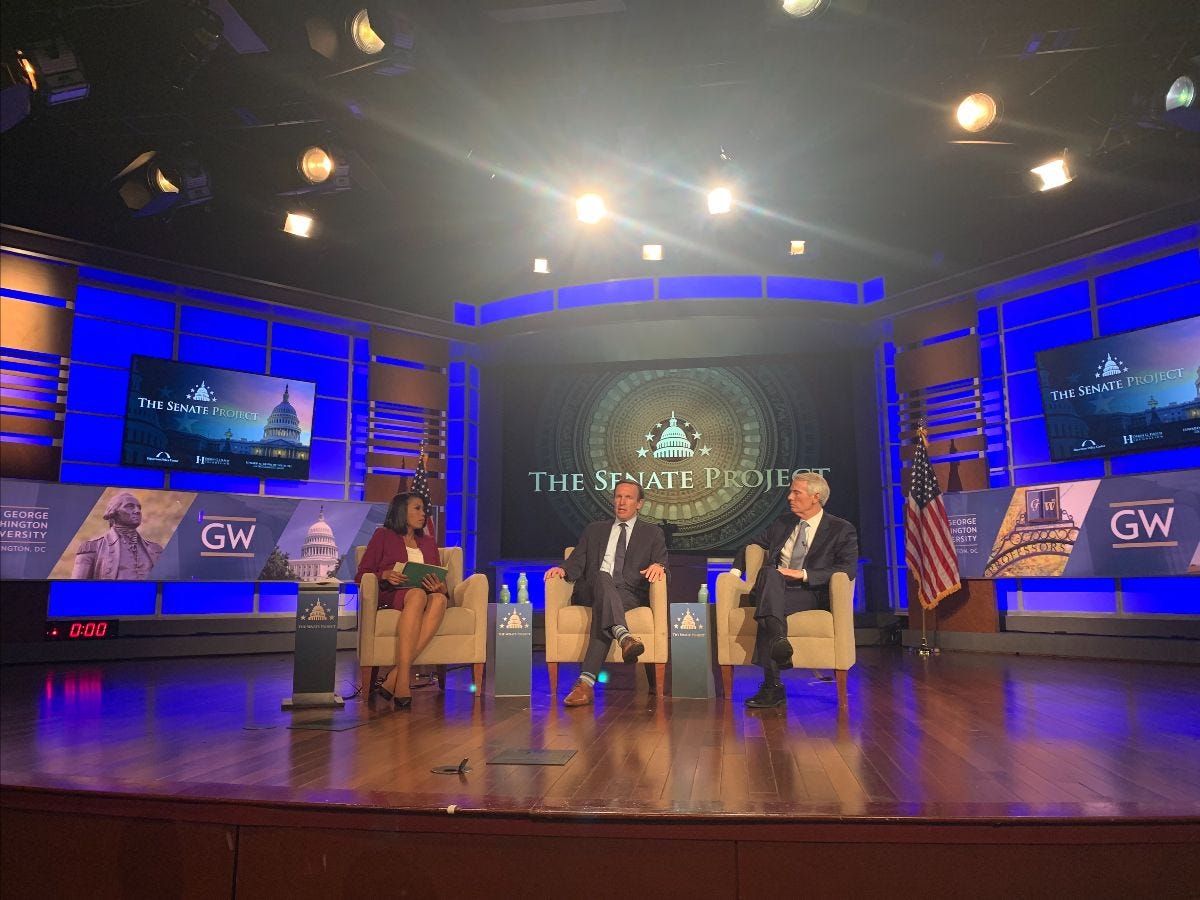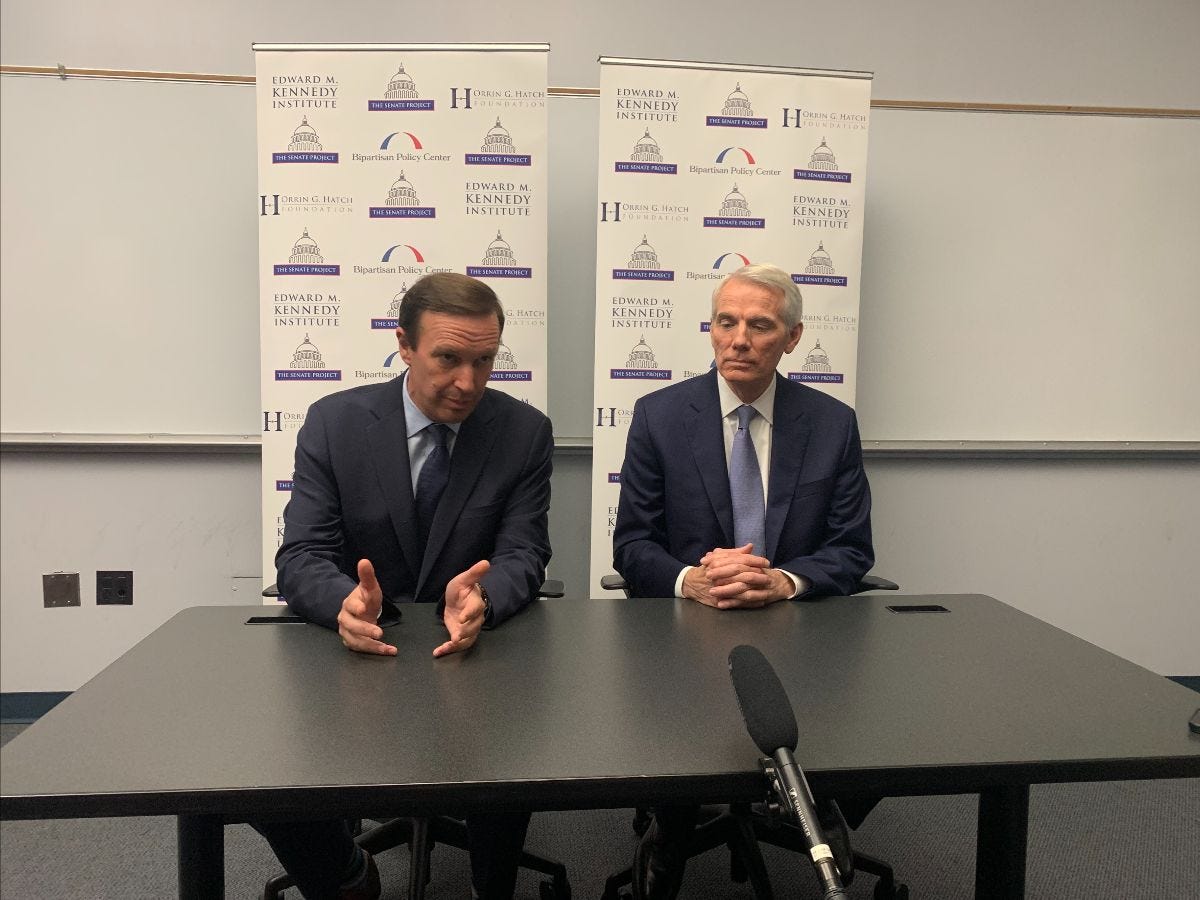Will Senate dealmaking survive?
By Gabe Fleisher
Good morning! It’s Tuesday, August 2, 2022. Election Day 2022 is 98 days away. Election Day 2024 is 836 days away.
Senate dealmakers seek to recover the art of compromise
Sens. Chris Murphy (D-CT) and Rob Portman (R-OH) got together Monday night and did something rare for two politicians not running against each other: they debated.
The event, hosted at George Washington University in D.C., was the second installment of “The Senate Project,” an initiative pairing up senators from across party lines to engage them in policy debates focused on exchanging ideas and exposing common ground.
The project is a collaboration between the Bipartisan Policy Center (BPC), a D.C. think tank, and legacy foundations honoring the late Sens. Ted Kennedy (D-MA) and Orrin Hatch (R-UT).
Like Kennedy and Hatch before them, Murphy and Portman are two of the modern Senate’s most prodigious dealmakers.
Murphy was the lead Democrat on the bipartisan gun control package passed earlier this summer; Portman was the lead Republican on the bipartisan infrastructure package inked last year. Each was a backer of the other’s signature effort.
The two senators were also part of the bipartisan gang that unveiled a proposed update to the Electoral Count Act last month. And they have both lent their support to various other cross-party efforts in the Senate, including the recent package to boost U.S. competitiveness with China and a pending bill to codify same-sex marriage.
As one might expect based on those bipartisan résumés, the debate was a collegial affair. Voices were never raised; no one was ever interrupted. They were more apt to apologize for going over their allotted minutes, as Portman did at one point, than to spar over who was getting more speaking time.
Freed from the formalities of the Senate floor, here they weren’t “the gentleman from” Connecticut or Ohio; they merely referred to each other as “Chris” and “Rob.”
“I don’t know that that was as spirited as Bernie and Lindsey,” Murphy said apologetically towards the end, referring to the first “Senate Project” face-off between the more ideologically disparate Sens. Bernie Sanders (I-VT) and Lindsey Graham (R-SC).

Despite their recent run of compromises, the duo warned Monday that bipartisanship in the Senate is getting harder.
“In today’s Senate, we have so little time to spend together,” Murphy bemoaned. “We have so little time to get to know each other, because we’re running off to fundraisers or back to our districts.”
“When those two gentlemen, the lions of the Senate” — Kennedy and Hatch — “were in their prime and involved, the Senate debated all the time,” Portman added. “We were viewed as the world’s greatest deliberative body.” Today, he noted, open amendment processes are rare, under Democratic or Republican control.
They both agreed that social media doesn’t make anything easier. “In this age of the immediate ability to communicate your thoughts, often that accrues to our detriment — not our benefit — as an institution that actually has to deliver results,” said Murphy.
Bipartisanship is poised to grow even scarcer once this year ends. Just as consummate aisle-crossers like Kennedy and Hatch are now gone, Portman is among a crop of Senate Republican dealmakers who are retiring in January, along with Sens. Roy Blunt (R-MO), Richard Burr (R-NC), and Pat Toomey (R-PA).
Each is expected to be replaced by more fire-breathing partisans. Portman, for example, spoke eloquently about the need to support democracy in Ukraine on Monday; the Republican nominee to succeed him is J.D. Vance, who has said, “I don’t really care what happens to Ukraine one way or another.”
Today, Missouri Republicans will choose a nominee to replace the courtly Blunt, who helped preside over Biden’s inauguration. A leading contender is former Gov. Eric Greitens, who has used Trumpian bombast to respond to allegations that he physically abused his wife and children and blackmailed his hairdresser-turned-mistress with nude photos.
When I asked Portman in a press gaggle after the debate if he feared for the institution of the Senate come January, he batted away the concern. “We’ll see,” he said. “I think people will step up, and they have, always, through the years.”
But Murphy wasn’t so sanguine. “I hope Rob’s right, but I’m worried,” he told me. “I look at these newer Republican senators and most of them don’t seem terribly interested in getting deals done in the Senate, so I am worried with this wave of retirements.”
He noted that people can change and grow into their roles over time. “But it’s true, we’re losing a number of really important parts of the Senate this year that had helped make the place work,” Murphy said. “I’m hopeful, but not super confident, that there are others willing to step up.”

Both senators also seemed supportive of some Senate rule changes to encourage bipartisanship going forward.
Portman told me that he opposes modifying the filibuster, a tool he said encourages consensus, but said it was time for the Senate to move on from its requirement that all 100 members must consent for a bill to advance speedily through the chamber.
He expressed support for adopting the House’s “suspension of the rules” procedure, which allows bills with two-thirds support to receive expedited consideration. Portman said such a change would “allow more freedom” for the Senate at large, “but it’s going to require us taking back some of those rights that every individual senator” has to gum things up.
Murphy agreed that fixes were needed to stop senators from abusing the “enormous negative power” that they each possess to slow the chamber down.
Meanwhile, “The Senate Project” aims to continue helping from the sidelines through its debate series.
Former C-SPAN anchor Steve Scully, who oversaw the initiative in his new role as senior vice president at BPC, told me in an interview that he hopes to host “three or four” more debates next year. The next one is set to take place in Utah in January.
Scully said that his group has reached out to a number of senators about participating; Sens. Ted Cruz (R-TX) and Amy Klobuchar (D-MN) have both expressed interest, he revealed.
“We’d love to do 50 of them, with all 100 senators,” he said. “But they’d have to agree to do it.”
Even in a time of rigidity and tribalism, he insisted, bipartisanship remains a worthy goal. “Meaningful change in the history of this country — civil rights, Social Security, every major program that we have in this country — has come together because the two parties have come together,” Scully told me.

Primaries to watch today
Voters head to the polls today in five states: Arizona, Michigan, Missouri, Kansas, and Washington. Here are the races to watch:
— A crowded Senate primary in Missouri. Republican leaders have thrown millions of dollars into this contest, rallying behind a last-ditch effort to stop disgraced former Gov. Eric Greitens from gaining the nomination. As a result, Greitens has been slipping in the polls in recent days, losing ground to state Attorney General Eric Schmitt and Rep. Vicki Hartzler.
Former President Donald Trump had long promised to make an endorsement in the race, but he stopped short of doing so Monday — instead throwing his support to “ERIC,” without specifying if he meant Schmitt or Greitens. Both Erics are claiming he backed them.
— Trump and Pence face off in Arizona. Former Vice President Mike Pence and outgoing Gov. Doug Ducey are backing land developer Karrin Taylor Robson in the state’s gubernatorial primary. Meanwhile, Trump is pushing for Republicans to nominate former news anchor Kari Lake, a leading election denier.
Lake is leading in the polls, as is Trump’s pick for Arizona’s GOP Senate primary, Peter Thiel protégé Blake Masters. Businessman Jim Lamon and state Attorney General Mark Brnovich are also competing for the Senate nod.

— A trio of GOP impeachment backers face challenges. Three of the 10 House Republicans who voted for Trump’s second impeachment — Michigan’s Peter Meijer and Washington’s Dan Newhouse and Jaime Herrea Beutler — face contentious battles against primary challengers supported by the former president.
— Two House Democrats compete against each other. The race between Michigan Reps. Andy Levin and Haley Stevens —caused by redistricting — has become the latest proxy war between two Jewish groups, the liberal J Street (backing Stevens) and the more moderate AIPAC (backing Levin). The two groups have poured millions into the member-on-member primary, but the centrist Stevens appears to have an upper hand in fundraising and polling.
— A post-Roe test in Kansas. The first statewide referendum on abortion since the Supreme Court struck down Roe v. Wade will be held today, as Kansans vote on whether or not their state constitution should protect the right to abortion.
More news you should know
— The U.S. killed al Qaeda leader Ayman al-Zawahri in a drone strike this weekend. President Biden announced the operation in a speech to the nation on Monday, declaring: “Justice has been delivered, and this terrorist leader is no more.”
As Osama bin Laden’s top deputy, Zawahri was one of the key masterminds of 9/11; he took the reins of al Qadea after bin Laden was killed by the U.S. in 2011. Zawahri was found and killed in Afghanistan, marking the first U.S. attack there since American forces left in a chaotic withdrawal last August.
— A Texas member of a far-right group received the longest sentence yet for a January 6 rioter. Guy Reffitt, of the right-wing Three Percenters militia group, was sentenced on Monday to 87 months in prison, just over seven years. Prosecutors said Reffitt, armed with a handgun, helped ignite the crowd on January 6. His punishment was handed down by a Trump-appointed judge.
Of the 800+ Capitol rioters to be arrested, Reffitt became the first to be convicted in a jury trial earlier this year. More than 200 of the others have received sentences so far (many as part of plea agreements), although none as long as Refitt’s. The median prison sentence for the rioters has been 45 days.
What’s going on in Washington today
All times Eastern. Click on an event’s time to watch it.
President Biden is isolating at the White House residence after re-testing positive for Covid. He’ll receive his daily intelligence virtually (10:15 am) and also virtually beam into an event (2:45 pm) with Gov. Gretchen Whitmer (D-MI), who will be signing a state executive order related to the national CHIPS and Science Act, which passed Congress with bipartisan support last week.
Whitmer is hoping to coax semiconductor chip manufacturers to use the $52 billion in subsidies they received in the bill to open up new plants in her states. Democrats would then be able to point to the new jobs created by the package to bolster their electoral odds this November, when Whitmer is up for re-election, and in 2024, when Michigan will be a key presidential battleground.
Vice President Kamala Harris has nothing on her public schedule, for the 10th weekday since the beginning of June.
White House press secretary Karine Jean-Pierre will hold her daily press briefing (3:30 pm).
The Senate will convene (12 pm) and quickly recess for each party to hold their weekly caucus launches (12:30 pm). After the lunches have concluded (2:15 pm), the chamber will vote to confirm Elizabeth Hanes as a U.S. district judge in Virginia.
If confirmed, Hanes will be the 75th Biden nominee to join the federal bench, the fastest clip of judicial confirmation recorded by any president since John F. Kennedy.
The House is on recess until September 13. The chamber will briefly gavel in for a pro forma session (3pm), a quick meeting held only to satisfy the constitutional obligation of convening every three days. No legislative business will be conducted.
House Speaker Nancy Pelosi is expected to touch down in Taiwan this morning (10:20 am), according to local media. She will be the highest-ranking U.S. official to visit Taiwan since then-House Speaker Newt Gingrich in 1997. China has threatened “grave consequences” if Pelosi goes through with the visit.
The Supreme Court is on recess until October.
Before I go...
Here’s something non-political that I found fascinating: Earth is speeding up.
According to new measurements from a UK government lab, the Earth’s rotation on its axis took 1.59 milliseconds less than 24 hours on June 29 — making that the shortest day ever recorded.
Scientists say if the planet’s rotation continues to get faster, a second may need to be removed from the atomic clock, our most precise tool to measure time.
“If Earth’s fast rotation continues, it could lead to the introduction of the first-ever negative leap second,” astrophysicist Graham Jones explained. Such a change could have a catastrophic effect on technology.
Read more here on this shift in time — and why scientists think it might be happening.
That’s it for today. If you enjoy Wake Up To Politics, it’s always appreciated if you donate to support the newsletter or buy some merch. Or if you tell your friends and family to sign up at wakeuptopolitics.com.
If you have any questions or feedback, feel free to email me: my inbox is always open.
Thanks for waking up to politics! Have a great day.
— Gabe



